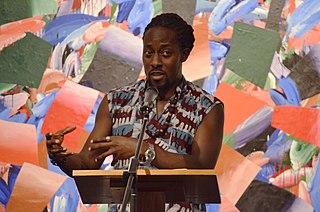A Quote by Nii Parkes
An up-close portrait of middle-class Nigeria exploring the boundaries of morals and public decorum. Pitched between humor and despair, with stripped-down, evocative prose, A Bit of Difference bristles with penknife-sharp dialogue, but its truths are more subtle, hiding in the unspoken. Ultimately, A Bit of Difference explores – with a hint of mischief–the problem of how to look like you have no problems when you have abundant problems–the universal problem of the socially-motivated classes.
Quote Topics
Abundant
Between
Bit
Boundaries
Class
Classes
Close
Decorum
Despair
Dialogue
Difference
Down
Evocative
Exploring
Hiding
Hint
How
Humor
Like
Like You
Look
Middle
Mischief
Morals
More
Motivated
Nigeria
No Problem
No Problems
Portrait
Problem
Problems
Prose
Public
Sharp
Socially
Stripped
Subtle
Truths
Ultimately
Universal
Unspoken
Up
Related Quotes
You've got problems in Central Asia. And you've got problems within our own communities back home. So if we end up saying, look, this has nothing to do with Islam or it's got no connection with that broader question, then we look, frankly, as if we're in denial about the problem. And the interesting thing in the Middle East is that they have absolutely no problem there in identifying that as Islamist extremism and calling it that.
Clipper took a relatively simple problem, encryption between two phones, and turned it into a much more complex problem, encryption between two phones but that can be decrypted by the government under certain conditions and, by making the problem that complicated, that made it very easy for subtle flaws to slip by unnoticed. I think it demonstrated that this problem is not just a tough public policy problem, but it's also a tough technical problem.
We are more than our problems. Even if our problem is our own behavior, the problem is not who we are-it's what we did. It's okay to have problems. It's okay to talk about problems-at appropriate times, and with safe people. It's okay to solve problems. And we're okay, even when we have, or someone we love has a problem. We don't have to forfeit our personal power or our self-esteem. We have solved exactly the problems we've needed to solve to become who we are.
It sounds so innocuous but the difference between 99 percent and 100 percent is huge. You can finish at 99 percent and you'll be hurting but if you push a tiny bit more - and that's the bit that makes the difference to your training - your legs just grind to a halt. It's like your engine is seizing up.
There has never been a merging of two lives where significant problems of daily living did not occur. One way or another, your relationship is going to be affected. The only question is how. There's a big difference between knowing and doing. It's not what happens between partners that determines the outcome of a relationship, it's how they handle what happens. If all you deal with in your relationship is problems, then you will have a problem relationship. If you want your pound of flesh with full acknowledgement that you're right, your future will be dim.
Mothers know the difference between a broth and a consommé. And the difference between damask and chintz. And the difference between vinyl and Naugahyde. And the difference between a house and a home. And the difference between a romantic and a stalker. And the difference between a rock and a hard place.







































